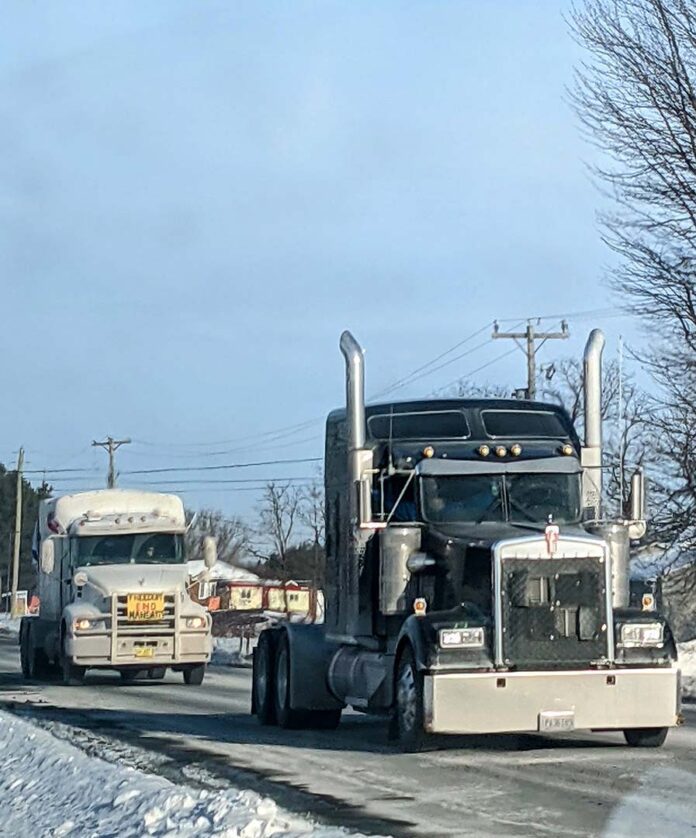by Brandon Mayer, Local Journalism Initiative Reporter
On February 1, with many of the region’s school students off for a PA day, a group of truckers with the so-called “Freedom Convoy 2022” and other protesters made a journey to thank local supporters, passing through Embrun, Finch, Chesterville, and Winchester. The Freedom Convoy started in response to mandates which were introduced in January requiring all those crossing the Canada-USA border ( in either direction) to either be fully vaccinated against COVID-19, or to isolate for a set period of time before entering the country.
Since isolation periods would cause significant loss of income for unvaccinated truckers, the new rules effectively constitute mandatory vaccination requirements for any truckers who move goods between Canada and the USA. Since its inception, the convoy has evolved into a movement that is claiming to be the voice for all who are against government instituted COVID-19 pandemic mandates and restrictions, including mask-wearing, vaccine passports, and gathering limits.
The rally has drawn the attention of both supporters and critics globally. The convoy has been the first movement to apply significant pressure on the Canadian and provincial governments in the two years since the COVID-19 pandemic began. The original goal of the rally was to force the government into submission by gridlocking Canada’s capital until all pandemic restrictions and mandates were lifted. More than a week into the protest, Prime Minister Justin Trudeau’s government had not budged regarding COVID-19 mandates, but the convoy organizers and participants certainly achieved the gridlock they were hoping for. Within the first few days, reports surfaced of the inconveniences caused to locals and businesses in the downtown core, while traffic reports consistently showed downtown streets impassible because of the protests.
Aerial photos have also shown what appears to be thousands of protestors gathering in downtown Ottawa, particularly on or near Parliament Hill. Media reports of the events have mostly focused on protestors committing morally unacceptable acts, such as displaying racist flags and putting signs on the statue of Terry Fox. This has also been the focus of Trudeau’s comments on the matter. He has consistently denounced the movement, calling the views of the protestors “unacceptable”.
. Leader of the Opposition Erin O’Toole (who has since been ousted by his party for unrelated political reasons) strongly criticized the Prime Minister’s response to the protests, as did Carleton MP Pierre Poilievre. The men have argued strongly in line with the views of the protestors, seeing them as average working Canadians who have been hit hard by the pandemic and simply want to be heard. Criticisms from O’Toole and Poilievre have focused on Trudeau’s unwillingness to meet with the protestors, which they argue is wrong, since the Prime Minister should hear and represent all Canadians, not just those he agrees with.
People’s Party of Canada leader, Maxime Bernier, also drew attention for joining in as one of the protestors, as did Saskatchewan MPs Andrew Scheer, Rosemarie Falk, Kevin Waugh, Warren Steinley, and Fraser Tolmie. In response to the movement, some provinces have dug their heels in regarding mandates, while others, including Saskatchewan, have taken a softened position, and have agreed, at least in part, with the protestors’ concerns.
With neither the federal Liberal government nor the protestors showing any willingness to budge, talks began late last week about the possibility of military intervention to end the gridlock in Ottawa’s downtown core. It is not clear as of the time of writing whether such steps have been taken by the time of publication. The protests started becoming more forceful by the end of last week, with many of the truckers blowing their horns at all hours of the day and night. Locally, reactions to the convoy have been mixed. On January 29, a smaller “Winchester convoy” of mostly passenger vehicles showed support by trekking down Highway 31 to Parliament Hill. Like nearly all aspects of the current COVID-19 pandemic, opinions about the merits of the “Freedom Convoy” are unlikely to ever resolve into agreement.



